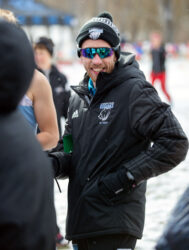Simon says active youth enjoy company
By Lethbridge Herald on November 18, 2020.
 Simon Schaerz, shown here coaching the Lethbridge College Kodiaks cross country running team, has been tracking the physical activities of kids aged 10 to 13 years as part of his research. Lethbridge College photo
Simon Schaerz, shown here coaching the Lethbridge College Kodiaks cross country running team, has been tracking the physical activities of kids aged 10 to 13 years as part of his research. Lethbridge College photoDale Woodard
Lethbridge Herald
Active youth typically prefer the company of other active youth.
After extensive interviews and tracking of physical activities of kids aged 10 to 13, that is the assessment of Lethbridge College instructor and Kodiaks cross country running coach Simon Schaerz.
Schaerz is completing research as a PhD candidate at the University of Lethbridge Faculty of Education.
Already well versed in physical activity as an instructor in Lethbridge College’s Exercise Science program, as well as the head coach of the Canadian Collegiate Athletic Association-champion Kodiaks running team and the father of two preschool-aged boys, Schaerz delved into the research of childhood physical activity.
“The statistics are relatively alarming in that only about one in 10 kids are engaging in enough physical activity over the course of a week,” said Schaerz. “So my interest was gauged in how kids look at physical activity and take a multi-factorial approach to trying to figure out what it is that kids do that keeps them active. That has been the basis of my research for the last few years.”
Schaerz’ main research took place over the summer months, but his proposal stage was in March and April, just as the COVID-19 pandemic was taking hold.
“I had to make a few adjustments in terms of how I gathered all of my data, but we got through that,” he said. “Over the summer I interviewed 16 kids and 11 parents and I got them to talk about how physical activity takes form within their family setting.”
Through June and July, Schaerz conducted his interviews and asked participants to track their steps and keep a journal of their physical activity for a week.
“They wrote down things like ‘Today I went and played soccer with my friends,’ or ‘I went for a bike ride with my parents,’” said Schaerz. “They wrote all that stuff down and I used those journals as a basis for the conversations of the interviews and asked them to elaborate and talk about previous experience and gather their perceptions relating to physical activity. I formulated a model that explains how these particular kids and families engage in physical activity.”
The main theme the cross country coach found was youth in their prepubescent years like to be active with others.
“They don’t like to go out by themselves in the sense that maybe an adult would, just going to the gym and doing some weights or hopping on the treadmill,” said Schaerz. “They like to be active with others and most of the physical activity they prefer to engage in is play-based or game-based. There is usually some sort of game component to it.
“So you’re playing tag on the playground or playing soccer during recess or in organized sports settings where various skill components are addressed through games and competition. That was the main way physical activity had taken form.”
The amount of physical activity differed in Stages 1 and 2 of the pandemic.
“During the initial response there was essentially no co-activity because parents didn’t want their kids to go out and meet with friends,” said Schaerz. “So sometimes they were active at home and sometimes they weren’t. But that really hampered their ability to go out and find friends to play with. So as a result for them, they really felt physical activity took a big hit.
“Then as the summer progressed in Stage 1 and Stage 2 things started to open up again and in Stage 2 we had summer camps and things like that. They were looking forward to that, the gradual sort of return to being as close to as normal as possible.”
But the upward trend of COVID cases across the province that have prompted a two-week lockdown is cause for some raised eyebrows.
“I’m concerned what happens in the event schools close again or there are suspensions to organized sports and those types of face-to-face programs. What will happen then?” said Schaerz.
In the meantime, Schaerz continues to work on his dissertation.
“Right now I’m in the writing phase,” he said. “I’ve more or less finished the writing portion. Now it’s just editing and peer review. It’s going through a committee and the committee will look at it and ask questions and we’ll edit the document based on the feedback. Then there will be a final defence where I present everything to the committee. After that it’ll be published.”
Schaerz said the goal is to complete all of the requirements by April 2021.
No matter when it’s complete, the Kodiaks coach said he’s enjoyed the research.
“I have context and that really helps,” said Schaerz. “That gives you a sense of purpose because at times doing this research you’re by yourself a lot and you really have to be interested in the topic because you do so much reading and devote so much time to it.
“If you don’t have a bit of a passion for it, it can become very daunting. So I’ve really enjoyed it. The Faculty of Education at the University of Lethbridge is a great faculty and there’s lots of support there. I’ve enjoyed my time there.”
Follow @DWoodardHerald on Twitter
-1

